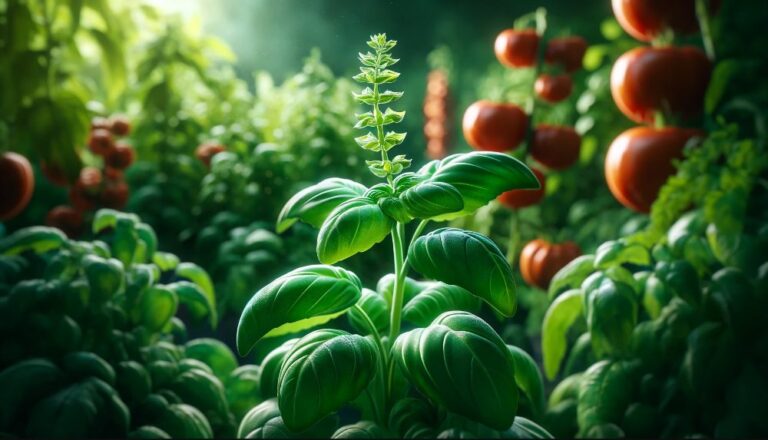This post may contain affiliate links which means I may receive a commission for purchases made through links. I only recommend products that I have personally used. As an Amazon Associate I earn from qualifying purchases. Learn more on my Private Policy page.
Vegetables such as tomatoes, peppers, and asparagus are good companion plants for basil because basil repels pests that attack them. Herbs like oregano, chives, cilantro, and parsley are also great basil companion plants as they share similar growing conditions with basil.
Root vegetables such as carrots, radishes, beets, and potatoes also make good basil plant companions because they help maximize garden space. In addition, flowers like marigolds and nasturtium work well with the basil to make your garden environment more pest-repellent.
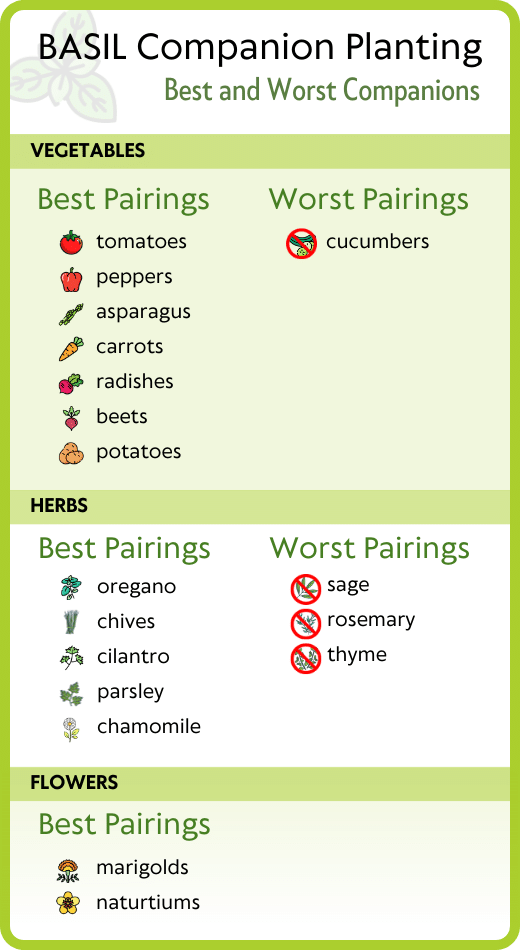
Table of Contents
Best Vegetable Companions to Basil
You can harness the natural pest-repelling qualities of basil to protect your many vegetables in your garden. Some of the best companion vegetables that benefit from proximity to basil are tomatoes, peppers and asparagus as basil deters pests that commonly prey upon these vegetables.
Tomatoes: Using Basil for Pest Defense

Tomatoes are vulnerable to pests like aphids, whiteflies, and hornworms. By planting basil alongside tomatoes, you create an environment that deters these common garden pests. Basil emits strong fragrances that repel these insects, acting as a natural pest deterrent for tomatoes.
Purchase tomato plants from Amazon or tomato seed varieties from SeedsNow
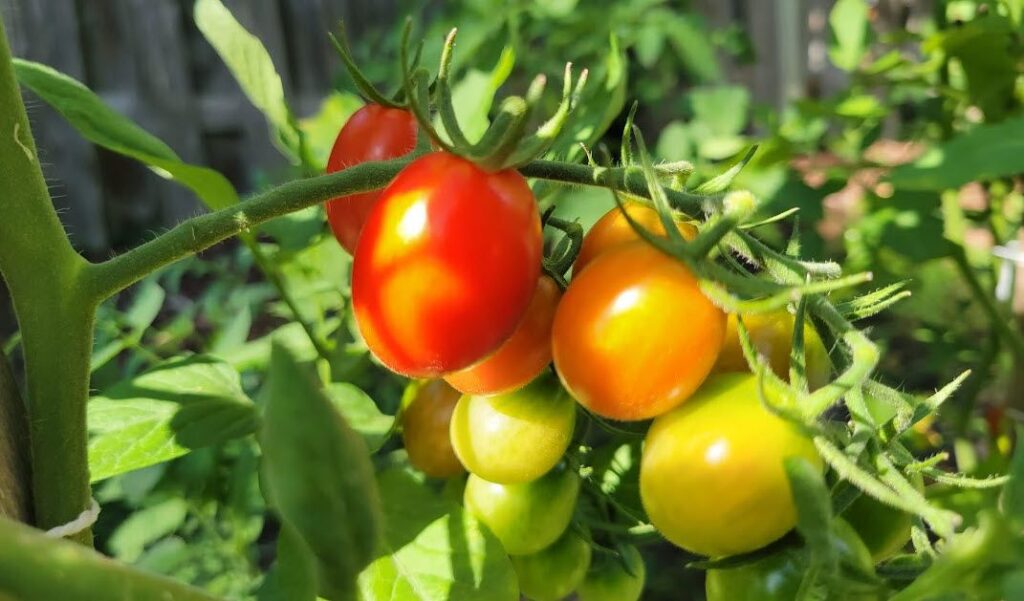
Consider interplanting different varieties of basil with your tomatoes to maximize the benefits of this companion planting combination. Sweet basil, Thai basil, or lemon basil all work well alongside tomatoes. The diverse scents emitted by these various types of basil will help to deter pests from attacking your tomato plants.
Asparagus: Use Basil as a Natural Pest Repellent

By interplanting basil with asparagus, you gain a powerful ally in deterring pests like the asparagus beetle and aphids. Basil’s strong aroma confuses and repels insects, making it harder for them to locate and damage your asparagus plants. Varieties like Genovese or purple basil work best. Experience the benefits of this companion planting combination for healthier, thriving crops.
Purchase asparagus crowns from SeedsNow
Peppers: A Basil Plant Companion

Basil’s aromatic compounds not only repel pests like aphids and spider mites but also attract helpful insects such as bees and predatory wasps. This makes basil an excellent companion for both bell peppers and chili pepper plants, promoting their health and offering pest defense.
Purchase pepper plants from Amazon or pepper seed varieties from SeedsNow
Basil and pepper plants flourish under similar conditions, requiring warm temperatures, full sun exposure, well-draining soil, and regular but not excessive watering. These shared growing conditions make peppers and basil ideal garden companion plants.
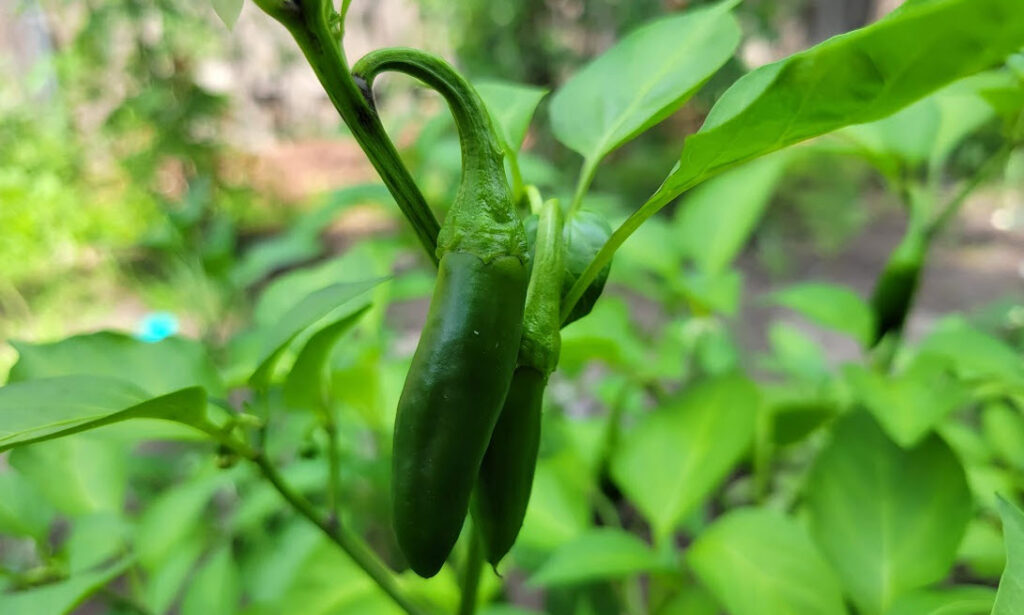
Basil and Root Vegetables: Ideal Garden Partners
Basil’s pest-repelling properties make it an excellent companion planting with root vegetables like carrots, radishes, beets, and potatoes.
The primary advantage of planting basil alongside root vegetables is its ability to deter pests. Basil has natural aromatic properties that help repel insects such as aphids, flies, and mosquitoes. These pests can cause significant damage to your precious crops if left unchecked.

Carrots benefit from interplanting with basil, which not only optimizes garden space but also repels pests such as aphids, carrot flies, and mosquitoes that can potentially harm the crop.
Purchase carrot variety seeds from SeedsNow

Radishes can reap the benefits of basil’s natural aromatic properties, which deter damaging insects, promoting a healthier crop. Radishes also benefit from being interplanted with basil to maximize the use of garden space.

Beets can be grown alongside basil to utilize garden space efficiently and prevent harmful pest infestations, thanks to the strong aroma that basil gives off.

Potatoes: interplanting potatoes with basil can be advantageous for maximizing garden space by utilizing areas that would otherwise go unused. Basil can also aid in repelling thrips, helping to boost your potato harvest.
Purchase seed potatoes from SeedsNow or Amazon
Best Herb Companion Plants for Basil
There are several herb options that share similar growing requirements with basil which can create a harmonious environment for your garden.
Oregano and Basil: Harmonious Garden Companions

Oregano is an excellent companion plant for basil due to its similar growing conditions and complementary flavors. Basil and oregano both thrive in well-drained soil and require full sun exposure.
Purchase oregano plants from Amazon or oregano seeds from SeedsNow
The aromatic oils present in oregano help repel pests that may harm basil plants. Oregano’s strong scent acts as a masking agent against pests that are attracted to the fragrance of basil leaves.
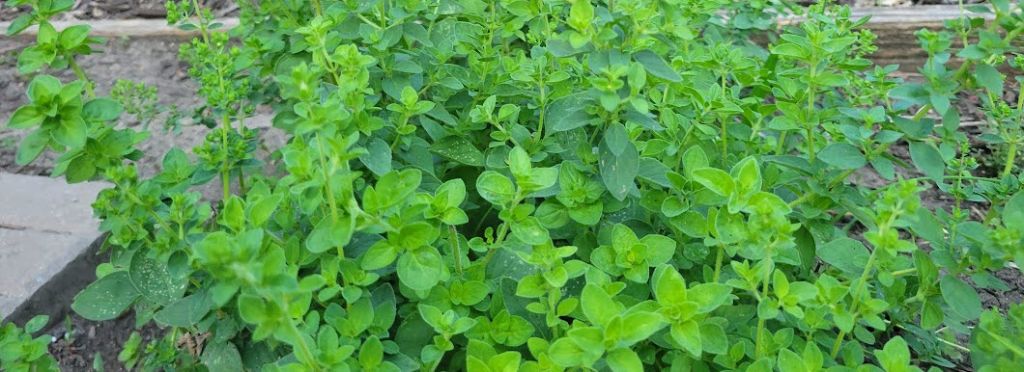
Chives and Basil as Garden Companions

Chives make fantastic companions for basil as they provide various advantages when grown together. Chives possess natural deterrent properties against common pests like aphids and Japanese beetles that could otherwise damage your precious basil leaves.
Purchase chive plants from Amazon or chive seeds from SeedsNow
Cilantro and Basil as Garden Partners

Cilantro and basil share similar cultivation requirements. Cilantro tends to bolt and flower quickly, while basil thrives throughout the summer months. By interplanting cilantro and basil, you can maximize space and extend the productivity of your herb garden. Their combined presence can attract beneficial insects, such as bees and butterflies, contributing to a healthy and vibrant garden ecosystem.
Purchase cilantro plants from Amazon or cilantro/coriander seeds from SeedsNow
Parsley and Basil: Similar Growing Requirements

Parsley and basil both thrive in well-drained soil with ample sunlight, although they can tolerate some shade. They prefer consistent moisture, but overwatering should be avoided to prevent root rot.
Additionally, both parsley and basil benefit from regular harvesting, which encourages bushier growth and prolongs their productive lifespan. With their similar needs, cultivating parsley and basil together simplifies garden maintenance and ensures optimal conditions for both herbs to flourish.
Purchase parsley plants from Amazon or parsley seeds from SeedsNow
Chamomile and Basil as Garden Companions

Chamomile and basil share similar preferences for well-drained soil and full sun, making them compatible in terms of growing conditions. Chamomile’s strong scent helps repel pests like aphids, beetles, and flies that can potentially harm basil. Basil, on the other hand, emits an aromatic fragrance that deters pests such as mosquitoes, whiteflies, and thrips, further enhancing the pest control benefits.
Purchase chamomile seeds from SeedsNow
Flower Companions to Basil
If you’re looking to add some beauty and vibrancy to your garden, consider pairing basil with colorful flowers like marigolds and nasturtiums. Not only will these flower companions enhance the aesthetics of your garden, but they also offer several benefits to your basil plants.
Marigolds: A Perfect Match for Fragrant Basils

Marigolds are an excellent garden companion to basil as they help protect your basil plants from pests. Not only do they add a pop of color to your garden, but marigolds emit a scent that repels harmful insects such as aphids, nematodes, and whiteflies, which are known to damage basil leaves. By interplanting marigolds alongside basil, you create a natural barrier that deters these pests from wreaking havoc on your herbs.
Purchase marigold plants from Amazon or marigold seeds from SeedsNow
Marigolds also attract beneficial insects like ladybugs and hoverflies that feed on aphids and other harmful pests. This creates a balanced ecosystem in your garden where these helpful insects act as natural predators.
Consider these options when choosing marigold varieties:
- French Marigold (Tagetes patula): With their compact size and bright orange or yellow blooms, French marigolds make an eye-catching companion for basil.
- African Marigold (Tagetes erecta): Known for their large flower heads in shades of yellow or orange, African marigolds provide a colorful backdrop against basil.
- Signet Marigold (Tagetes tenuifolia): If you prefer smaller blooms in vibrant shades of red or gold, signet marigolds are an ideal choice. They also have edible flowers that can be used as garnishes or added to salads.
Nasturtiums: A Beneficial Flower Companion

Nasturtiums are a fantastic flower companion for basil by acting as a natural pest deterrent, repelling aphids, whiteflies, and cucumber beetles that can harm basil leaves.
In addition to their pest-repelling properties, nasturtiums attract pollinators such as bees and butterflies. The presence of these beneficial insects enhances pollination in your garden, leading to healthier basil plants and increased yields.
Purchase nasturtium seed varieties at SeedsNow
Consider these options when selecting nasturtium varieties:
- Alaska Mix: This variety features stunning variegated leaves in shades of green and cream, accompanied by vibrant red, orange, and yellow flowers.
- Jewel Mix: With its bright blooms in various shades of red, orange, gold, and yellow, the jewel mix adds a burst of color to any garden.
- Empress of India: This compact nasturtium variety boasts deep crimson flowers against dark green foliage for an elegant contrast.
Worst Companion Plants for Basil
There are certain plants that should be avoided when planting basil due to their dissimilar requirements and potential negative effects.
3 Herbs Not to Plant with Basil
Sage, rosemary, and thyme are not good basil garden companions due to their different growth requirements. Basil thrives in fertile soil with consistent moisture, while these herbs prefer well-drained soil and drier conditions. Planting them together can lead to competition for resources such as water and nutrients.

Sage and basil are poor growing companions because they have different soil and watering requirements. Sage is a hardy perennial that thrives in well-drained, somewhat dry soil, conditions that aren’t optimal for basil growth. The growth rates between sage and basil are also quite different, leading to competition for resources and potential overcrowding in the garden bed.

Rosemary and basil do not make good garden companions because rosemary requires well-drained soil and minimal watering, while basil prefers consistently moist soil, making it difficult to meet the specific needs of both plants in the same growing environment.

Thyme and basil should not be grown together because thyme is a perennial herb that prefers drier soil and less frequent watering, whereas basil is an annual herb that thrives in moist soil, making it challenging to provide the optimal conditions for both herbs in the same planting area.
To ensure the optimal growth of your basil, it is best to separate them from herbs with dissimilar requirements. This way, you can provide each plant with the specific conditions they need for healthy development.
Cucumbers and Basil Make Poor Garden Companions

Cucumbers are poor companion plants to basil as they compete with basil for both space and nutrients. Cucumbers are notorious for their vigorous growth habit and sprawling vines. While they may seem harmless next to your basil patch initially, as they grow larger, they can quickly overtake the space meant for your basil plants. Cucumbers have high nutrient demands which can lead to competition between the two plants.
To prevent overcrowding and nutrient depletion in your garden bed or container garden, it is advisable to keep cucumbers separate from your basil plants. This way, both crops can flourish without hindering each other’s growth.
Rue and Bail Are Not Good Companions
Rue (Ruta graveolens) has incompatible growing conditions compared to basil as it prefers drier and more alkaline soil. Basil, on the other hand, thrives in moist and slightly acidic soil. Planting them together can lead to suboptimal growing conditions for both plants.
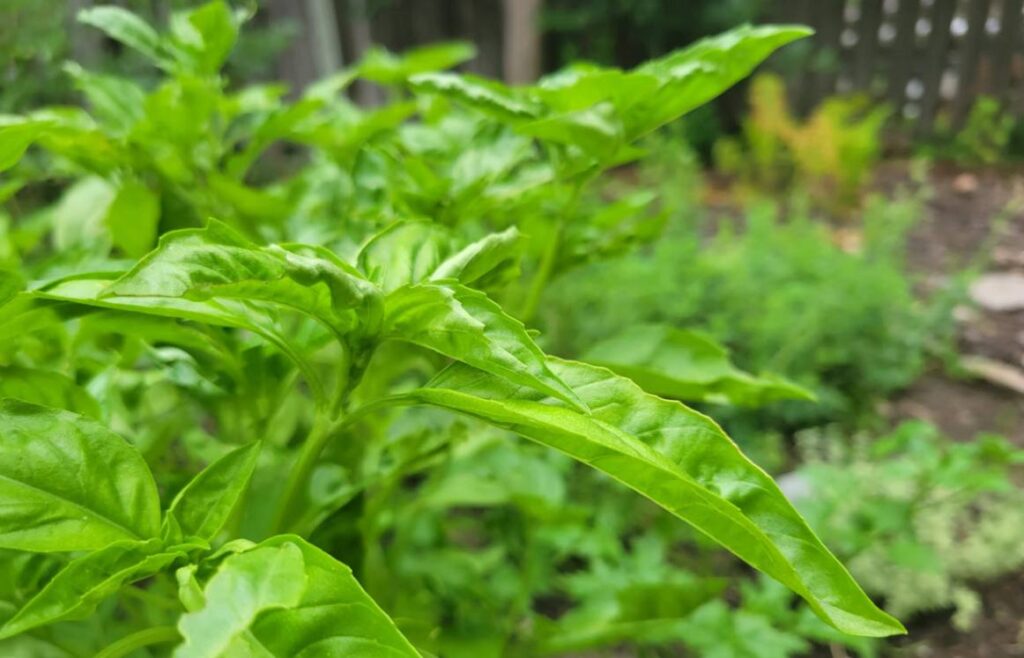
Conclusion: Harnessing the Power of Basil Companion Planting
In conclusion, basil’s potent fragrance and pest repellent properties make it an excellent companion plant in your garden. Its compatibility with a variety of vegetables, herbs, and flowers can enhance the overall yield and aesthetics of your garden while acting as an efficient and natural pest deterrent.
Conversely, it’s important to avoid planting basil alongside certain herbs like sage, rosemary, thyme, and plants like cucumbers due to their incompatible growing requirements and potential competition for resources. By mindfully implementing basil companion planting, you can optimize the use of garden space, reduce dependency on pesticides, and foster a healthier, more vibrant garden ecosystem.
Frequently Asked Questions (FAQs)
Can I plant basil with other herbs?
Basil thrives alongside herbs like oregano, chives, cilantro, parsley, and chamomile. These herb companions share similar growing requirements and are considered great companions for basil.
Can I plant basil next to flowers?
Marigolds and nasturtiums make good basil companion plants. They not only add beauty to your garden but these flowers also attract beneficial insects. Marigolds also helps to repel insects such as aphids, nematodes, and whiteflies, acting as a natural pest control for your herb or vegetable garden.
Are there any vegetables I should avoid planting near basil?
Cucumbers are not good companions for basil because they take up too much space and nutrients. Cucumbers grow quickly and spread out a lot, which can crowd out the basil. Basil and cucumbers will end up competing with each other because u require a high amount of nutrients.
What herbs should not be planted with basil?
Rosemary, sage and thyme are not good basil companion plants as they have very different growing requirements. Basil likes moist soil, while these herbs prefer drier soil. Planting them together can cause competition for water and nutrients.
Is basil a good companion plant for carrots?
Basil is a good companion plant to carrots and other root vegetables like radishes and beets because it keeps away pests like carrot flies and aphids. Root vegetables are also considered good basil companion plants as these combinations help to use garden space efficiently.
What does basil repel in the garden?
Basil is known for repelling mosquitoes, flies, carrot flies, tomato hornworms, aphids, asparagus beetles, and whiteflies. The strong aroma of basil is believed to be responsible for warding off these common garden pests, making basil a great companion plant for tomatoes, asparagus and carrots.
Last Updated on 28 April 2024 by Bob Lee

